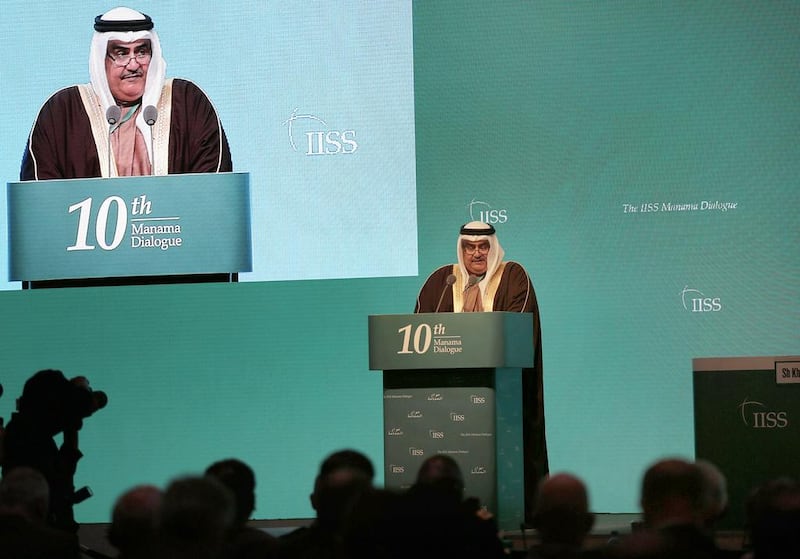LONDON // British warships are to return to their own permanent base in the Arabian Gulf more than 43 years after the UK withdrew its forces from Bahrain and Sharjah on the eve of the UAE’s founding.
The agreement to develop dedicated shipyard facilities for the Royal Navy at the Bahrain Defence Force’s Mina Salman Port was signed on Friday by Bahrain’s foreign minister and the British foreign secretary.
The signing ceremony took place during the 10th Manama Dialogue conference, organised by the International Institute for Strategic Studies. Topics at the conference, which ends on Sunday, have included the importance of international cooperation in countering extremism and terrorism in the Middle East.
The announcement was made exactly 43 years and four days after the Royal Navy’s former Gulf Squadron sailed away for the last time from HMS Jufair naval base, on December 1, 1971, ending a permanent presence of British warships in the Gulf that dated back to the early 19th century.
The Gulf Squadron was formed by the British in 1821, as part of the Bombay Marine. It was disbanded in 1863, with the rest of the Indian navy, but reformed as a Royal Navy unit six years later and continued to serve in the Gulf until the British withdrew in 1971.
Sheikh Khalid bin Ahmed bin Mohammed Al Khalifa, Bahrain’s foreign minister, said the new naval base marked “a further step in the long cooperation between Bahrain and the United Kingdom” and reaffirmed “our joint determination to maintain regional security and stability in the face of challenging circumstances”.
The development of a dedicated base for UK operations reflects Britain’s increasing commitment to the battle against extremism in the region. Last month, the British Royal Air Force carried out its first drone attack on ISIL militants in Iraq, using a Reaper to attack a concentration of fighters north of Baghdad.
Michael Fallon, the UK defence secretary, said the agreement represented “a permanent expansion of the Royal Navy’s footprint and will enable Britain to send more and larger ships to reinforce stability in the Gulf. We will now be based again in the Gulf for the long term.”
The announcement follows the news in April that the US was to spend $580 million (Dh2.1 billion) expanding its facilities in Bahrain to accommodate a fleet of futuristic Littoral Combat Ships. The LCS, a new breed of multi-role vessel designed to operate in coastal waters in support of anti-terrorist operations, is expected to be operational in the Gulf by 2018.
Currently, operations in the Gulf are thought to account for the deployment of one-third of all Royal Navy warships, a proportion that could now increase.
Britain currently has four minehunter warships permanently based in Bahrain. These have been relying on the extensive facilities of the US Fifth Fleet at the US Navy base at Jufair, which are also used to service British frigates and destroyers on tours of duty in the Gulf.
One such vessel is HMS Northumberland, a frigate that returned to its home base in Plymouth, UK, on Friday for maintenance after a seven-month tour of duty in the Gulf and the Indian Ocean.
The Royal Navy said HMS Northumberland had been engaged in “a wide range of maritime security operations, including counter-piracy, counter-drugs, escort duties, boarding operations and international exercises, all designed to deter and disrupt illegal use of the sea to protect maritime security and secure freedom of navigation and trade for all nations”.
In the future, Royal Navy ships such as HMS Northumberland could be based and maintained at Bahrain for much longer periods.
Bahrain will be footing most of the $23 million (Dh84m) cost of developing the new base, which will be built alongside the US navy facilities at Jufair.
The base will also house the new £6 million (Dh34m) headquarters for the UK Maritime Component Command (UKMCC), a detachment of about 100 Royal Navy personnel in Bahrain responsible for UK warships, aircraft and personnel deployed in the Middle East, on which work began in April.
James Onley, senior lecturer in Middle Eastern history at Exeter University's Institute of Arab & Islamic Studies, told The National the decision to return to a permanent base in the Gulf reflected the importance to the UK of the GCC, Britain's second most important trading block after the European Union.
“Kuwait is the single largest investor in the UK, while the UAE and Qatar remain very important trade partners, who have invested billions in the UK,” he said.
The UK’s trade, social and cultural ties with Oman, the UAE, Qatar and Bahrain were “comparable to those with Commonwealth countries such as Canada and New Zealand”.
Between 1935 and 1971, Jufair was a Royal Navy base that served as the headquarters of its Gulf Squadron, which protected the states of Kuwait, Bahrain, Qatar, Oman and the Trucial States, up to the eve of the creation of the UAE in 1971.
“So for all intents and purposes,” said Dr Onley, “the Royal Navy’s construction of its UKMCC headquarters a few hundred metres from its old base is, indeed, a return ‘home’ to the Royal Navy’s old Gulf headquarters.”
foreign.desk@thenational.ae





